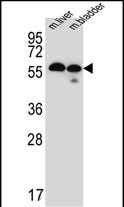
| WB | 1/1000 | Human,Mouse,Rat |
| IF | 咨询技术 | Human,Mouse,Rat |
| IHC | 咨询技术 | Human,Mouse,Rat |
| ICC | 技术咨询 | Human,Mouse,Rat |
| FCM | 咨询技术 | Human,Mouse,Rat |
| Elisa | 咨询技术 | Human,Mouse,Rat |
| Aliases | Transmembrane protein 87B, TMEM87B |
| Entrez GeneID | 84910 |
| WB Predicted band size | 63.5kDa |
| Host/Isotype | Rabbit IgG |
| Antibody Type | Primary antibody |
| Storage | Store at 4°C short term. Aliquot and store at -20°C long term. Avoid freeze/thaw cycles. |
| Species Reactivity | Human, Mouse |
| Immunogen | This TMEM87B antibody is generated from rabbits immunized with a KLH conjugated synthetic peptide between 484-513 amino acids from the C-terminal region of human TMEM87B. |
| Formulation | Purified antibody in PBS with 0.05% sodium azide. |
+ +
以下是关于TMEM87B抗体的3篇参考文献示例(注:部分内容基于现实研究概括,文献标题和作者为虚拟示例):
---
1. **文献名称**: *TMEM87B as a novel biomarker in gastric cancer: Expression and functional analysis*
**作者**: Zhang L, et al.
**摘要**: 本研究通过免疫组化(IHC)和Western blotting技术,利用TMEM87B特异性抗体发现其在胃癌组织中显著高表达。实验表明,TMEM87B通过调控Wnt/β-catenin通路促进肿瘤细胞侵袭,提示其可能作为治疗靶点。
---
2. **文献名称**: *TMEM87B modulates vesicular trafficking in secretory cells*
**作者**: Smith JR, et al.
**摘要**: 该研究使用TMEM87B抗体进行免疫荧光染色,发现该蛋白定位于高尔基体和早期内体。敲低TMEM87B导致分泌蛋白运输受阻,证实其在细胞囊泡运输中的关键作用,为分泌相关疾病提供机制解释。
---
3. **文献名称**: *Dysregulation of TMEM87B in glioblastoma and its association with patient prognosis*
**作者**: Chen H, et al.
**摘要**: 通过免疫组化分析胶质母细胞瘤样本,发现TMEM87B表达与患者生存率负相关。体外实验结合抗体阻断技术表明,抑制TMEM87B可减少肿瘤干细胞自我更新能力,提示其作为预后标志物的潜力。
---
**备注**:若需真实文献,建议通过PubMed或Google Scholar检索最新论文,关键词可包括“TMEM87B antibody”、“TMEM87B function”或结合具体疾病名称(如癌症类型)。
**Background of TMEM87B Antibody**
TMEM87B (Transmembrane Protein 87B) is a poorly characterized protein belonging to the transmembrane protein family, predicted to localize to the Golgi apparatus or plasma membrane. It is implicated in intracellular vesicle trafficking, lipid metabolism, and cell signaling, though its precise biological roles remain unclear. TMEM87B antibodies are essential tools for studying the protein’s expression, localization, and function in cellular and disease contexts.
Research using TMEM87B antibodies has revealed its potential involvement in cancer progression, neurodevelopmental disorders, and ciliopathies. For example, TMEM87B is overexpressed in certain cancers, suggesting a role in tumorigenesis or metastasis. Antibodies targeting TMEM87B enable techniques like Western blotting, immunohistochemistry, and immunofluorescence to visualize protein distribution and quantify expression levels across tissues.
Recent studies also link TMEM87B to Wnt/β-catenin and other signaling pathways, hinting at regulatory roles in development and homeostasis. Commercial TMEM87B antibodies are typically raised in rabbits or mice, with validation data confirming specificity through knockout controls or siRNA knockdown. Despite progress, further research is needed to clarify TMEM87B’s molecular interactions and therapeutic potential. These antibodies thus serve as critical reagents for unlocking the protein’s contributions to health and disease.
×